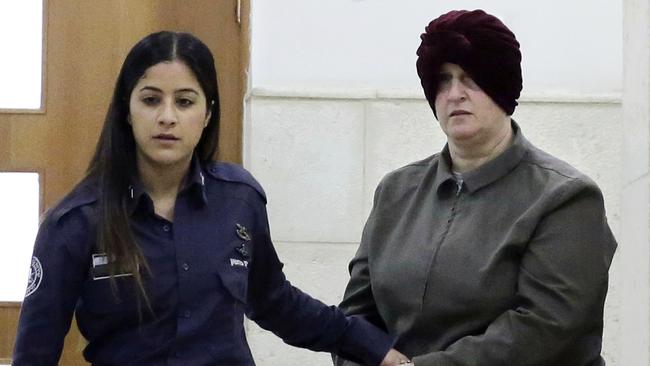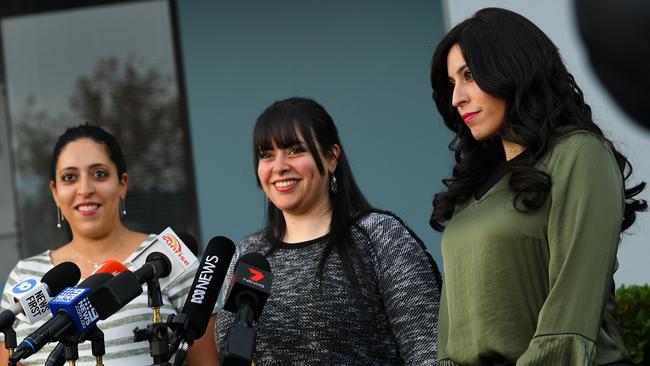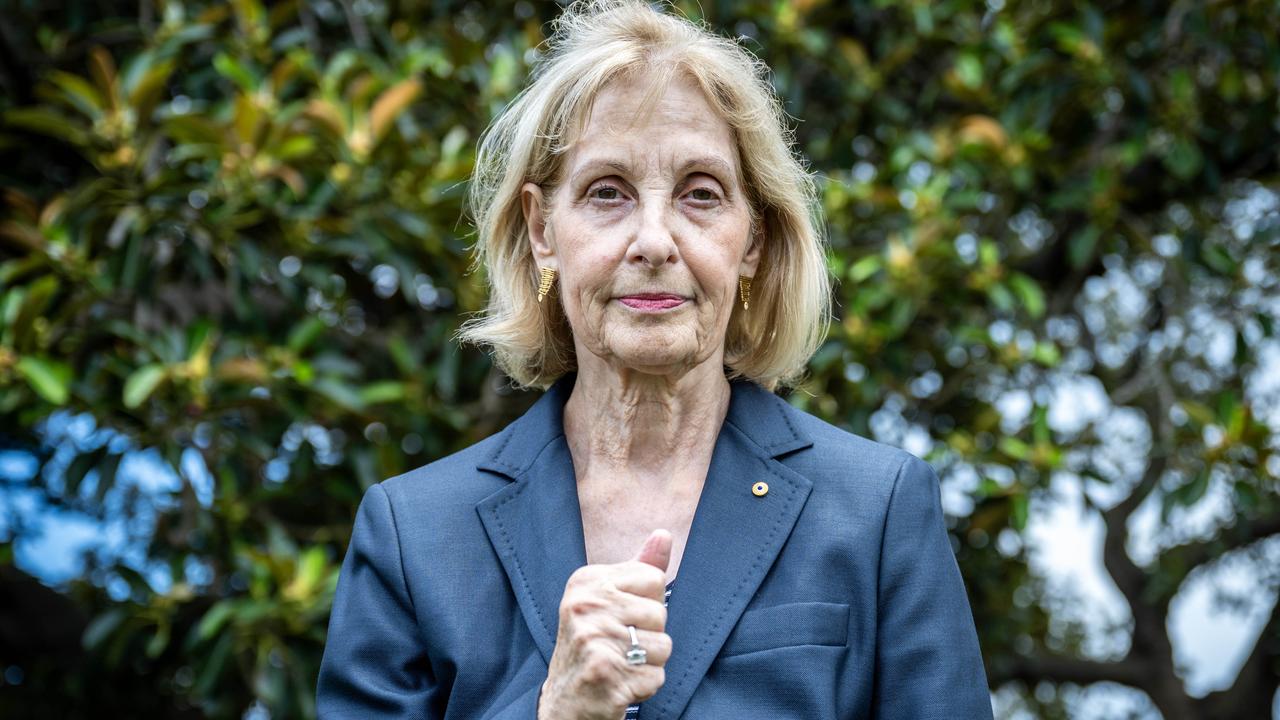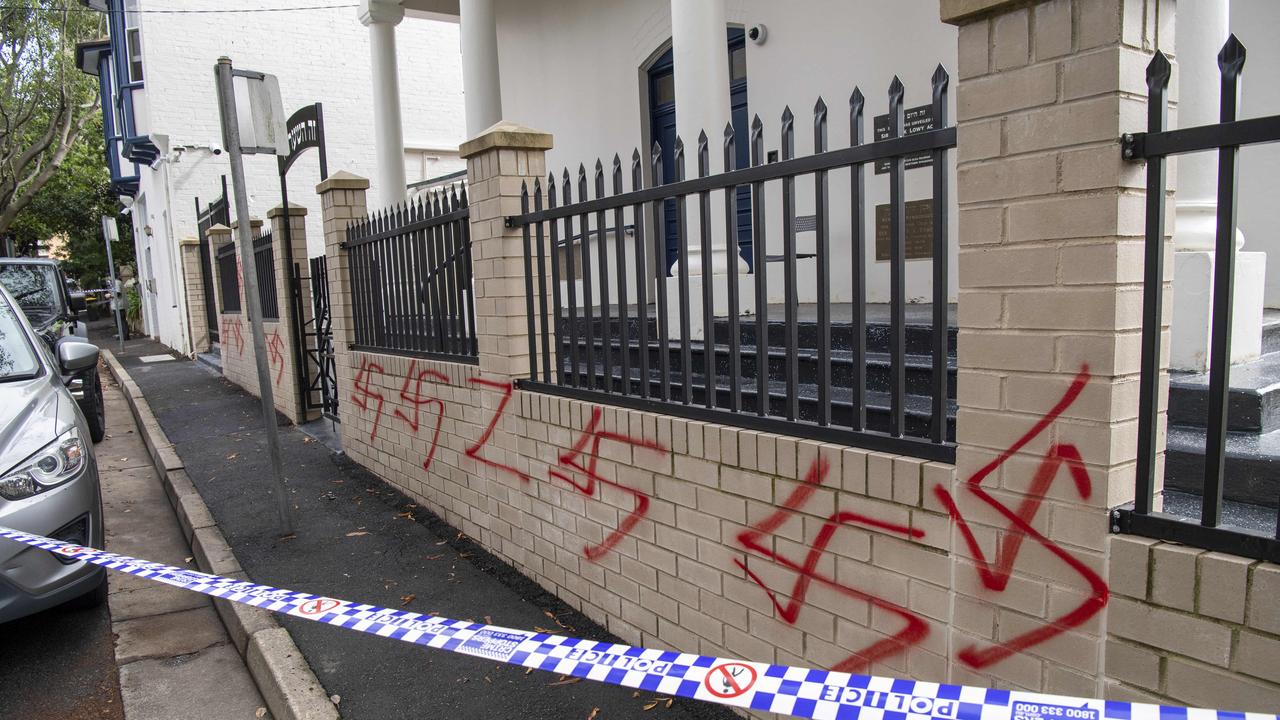Malka Leifer’s support in Israel falls away as charade exposed
She’s pulled every trick in the book, but there’s been a stunning turnaround for the woman formerly treated ‘like a God.’

The drama that played out in District Court 218 in Jerusalem this week wasn’t all about Malka Leifer, who as usual wasn’t there. Jaws dropped when her usually voluble lawyers let slip that they might not be around for much longer either.
One of the many mysteries surrounding the case of the fugitive ex-principal of Melbourne’s Adass Israel Jewish school is the lavish support she has had since fleeing Australia in the dead of night 12 years ago over allegations she had sexually abused female students, including three sisters.
The pricey lawyers in Israel who fought tooth and nail to keep her out of court and went close in 2016 to killing off Canberra’s extradition bid are one manifestation of a shadowy network that has supported Leifer through thick and thin.
But the charade that the meek-looking mother of eight was incapacitated by mental illness finally unravelled on Tuesday. Judge Chana Miriam Lomp found it had mostly been an act and Leifer, 54, was fit to face extradition and potentially trial in Australia for her alleged crimes.
“I hold the defendant is impersonating with regard to her ability to go to trial and her ability to function,” Lomp ruled. “She is eligible to stand trial and therefore I order that the extradition procedure be resumed in her case.”
Accused now isolated
For the first time, Leifer looked vulnerable and alone. Her rabbi husband was nowhere to be seen, leaving their eldest son, Sheile, 32, to bear witness to his mother’s moment of truth. Clad in black Orthodox garb, the young man sat beside an aunt and white-bearded uncle, gripping a traditional charm. All three refused to speak to reporters.

Israel’s new Housing Minister, Rabbi Yaakov Litzman, was otherwise occupied. He is said to have been one of Leifer’s most active benefactors. When he ran the health portfolio he allegedly leaned on state psychiatrists to change their evidence in her favour, sparking a police investigation last year.
Back then, Litzman was ranked among Israel’s most powerful ultra-Orthodox Jews, a leader of the fundamentalist, 50,000-strong Gur Hassidic sect and head of its political arm, the Agudat Israel party. His support has helped prop up Prime Minister Benjamin Netanyahu’s governing coalition. Like Bibi, who is under indictment for alleged corruption, Litzman appears determined to ride out his legal travails; he emphatically denies intervening on Leifer’s behalf.
How ironic that his downfall was COVID-19. As health minister, he reportedly ignored his own department’s rules on social distancing and contracted the virus last month. His unworldly approach had already undermined confidence in his ability to manage the pandemic, robbing Leifer of a powerful ally when she needed all the friends she could muster. Sidelined to the more junior housing job, it’s unlikely Litzman could help if he wanted to.
Another senior rabbinical figure, Yitzchak Dovid Grossman, walked away from Leifer after she was rearrested by Israeli police in 2018 and remanded to Neve Tirza women’s prison near Tel Aviv. A recipient of the Israel Prize for lifetime achievement for his work with child protection group Migdal Ohr, Grossman offered to take Leifer into his home if she were granted bail, oblivious to the optics. Faced with an outcry at home and from Australia, he retreated.
In court on Tuesday, Leifer’s uncharacteristically restrained lawyers, Yahuda Fried and Tal Gabay, only fired up when the question of their ongoing participation in the case cropped up, after Lomp delivered judgment. Voices were raised. The defence lawyers insisted they needed more time before the next hearing, in July, to sort out the appearances. There was mention of “top-up” payments, observers in the partially cleared court say. Gabay did not respond to requests to clarify their position.
Defeat sinks in
What is beyond doubt is that the momentum shifted decisively against Leifer, who had pulled just about every trick in the book to have the extradition quashed. Her lawyers said she suffered from stress-induced psychosis that confined her to home, often to bed, rendering her unfit for court. She was too sick to talk to even them, they claimed. The theatrics that accompanied her rare appearances would surely test the patience of an Australian judge: she fainted in court on one occasion and in the holding cells at other times.
Typically, she would check herself into hospital a few days prior to scheduled hearing dates. The sisters in Melbourne who had gone to Victoria Police in 2012 complaining of years of sexual abuse by Leifer believed she was gaming the system, not for the first time. The persistence of Nicole Meyer, 34, Dassi Erlich, 32, and Elly Sapper, 31, was key to progressing the case as the odds stacked up against the accused woman ever answering the 74 charges of sexual abuse issued by the police, including rape.
Leifer’s small but ferociously loyal support base was there for her from the start. The Adass Israel school was a time capsule of ultra-Orthodox Judaism in Melbourne’s leafy inner east. When Leifer was recruited from Israel in 2000 it didn’t have a formal curriculum of non-religious studies: the girls lived in homes with no internet, TV or radio, and studied from books that were carefully vetted to exclude worldly pursuits, especially romance.
Community support
Leifer was “like a God” in the close-knit Adass community, Meyer remembers. But her troubled home life sometimes encroached on school. She vividly remembers the day in 2002 when Leifer turned up with a black eye. The gossips blamed Rabbi Jacob, her husband, who had a fearsome reputation. By 2008, the family had grown to eight children, three born in Australia.
The assistance they received to leave the country was investigated by Victoria Police, which still won’t comment on the outcome. Within hours of being stood down by the school on March 5, 2008, Leifer and some of her children were on a 1.20am flight out of Melbourne.
The tickets were bought by Adass community member Robert Klein and a company associated with then school board president Yitzhok Benedikt, according to evidence accepted in civil court proceedings launched by Erlich. She was awarded damages of $1.024m in a 2015 judgment that also pinged Leifer for $150,000 in exemplary damages.
Then Victorian Supreme Court judge Jack Rush found the school’s conduct amounted to “disgraceful and contumelious behaviour demonstrating a complete disregard for Leifer’s victims … a disdain for due process of criminal investigation in this state”.
If justice delayed is justice denied, the sisters have every right to be indignant. Tuesday’s hearing was the 67th since the Australian government sought Leifer’s extradition in 2014. By 2016, the case looked dead in the water. Then presiding judge Amnon Cohen suspended the proceedings and lifted Leifer’s home detention order. “We didn’t know what to think at that point,” Meyer says.

The demise
Hubris proved to be her undoing. In May 2017, a smiling Leifer was photographed in the crowd at a religious festival in northern Israel. Child protection advocate Shana Aaronson put a private detective on her tail and captured video of her leading what appeared to be a perfectly full and normal life in the ultra-Orthodox enclave of Bnei Brak, where she lived with her sister. Jacob’s ongoing absence from the public gallery of the Jerusalem District Court excited speculation that the couple had separated, unusual in their circle.
The Israeli police swooped, charging Leifer with obstruction of justice. When her lawyers secured her release from jail, Israeli state prosecutors acting on behalf of the Australian government went to the country’s Supreme Court to keep her behind bars as a flight risk, where she remained this week as the last of her defences crumbled. At the same time, the political pressure from Australia was being ramped up.
Former Victorian Liberal premier Ted Baillieu and his Labor successor Dan Andrews are in the sisters’ corner. Malcolm Turnbull as prime minister pressed the case with Netanyahu when he visited Israel in 2017. Australia’s then ambassador, Dave Sharma, who would win back Turnbull’s Sydney seat of Wentworth for the Liberal Party last year, worked hard behind the scenes to keep the extradition in front of Israeli decision-makers.
It was the first issue raised when Netanyahu saw a heavyweight Australian delegation in his Jerusalem office last October 29 led by Zionist Federation of Australia president Jeremy Leibler. At his side were former PM John Howard, former deputy PM and Labor treasurer Wayne Swan, former Liberal Party leaders Alexander Downer and Brendan Nelson, and former Labor minister and factional powerbroker Stephen Conroy.
Netanyahu made a crucial pledge: the justice minister would approve the extradition without delay if and when it cleared the courts. “He said, absolutely, ‘we have no desire to keep accused pedophiles in this country’,” Leibler says. “He obviously has his political considerations … but I do believe that is the view of the vast majority of decision-makers.”


